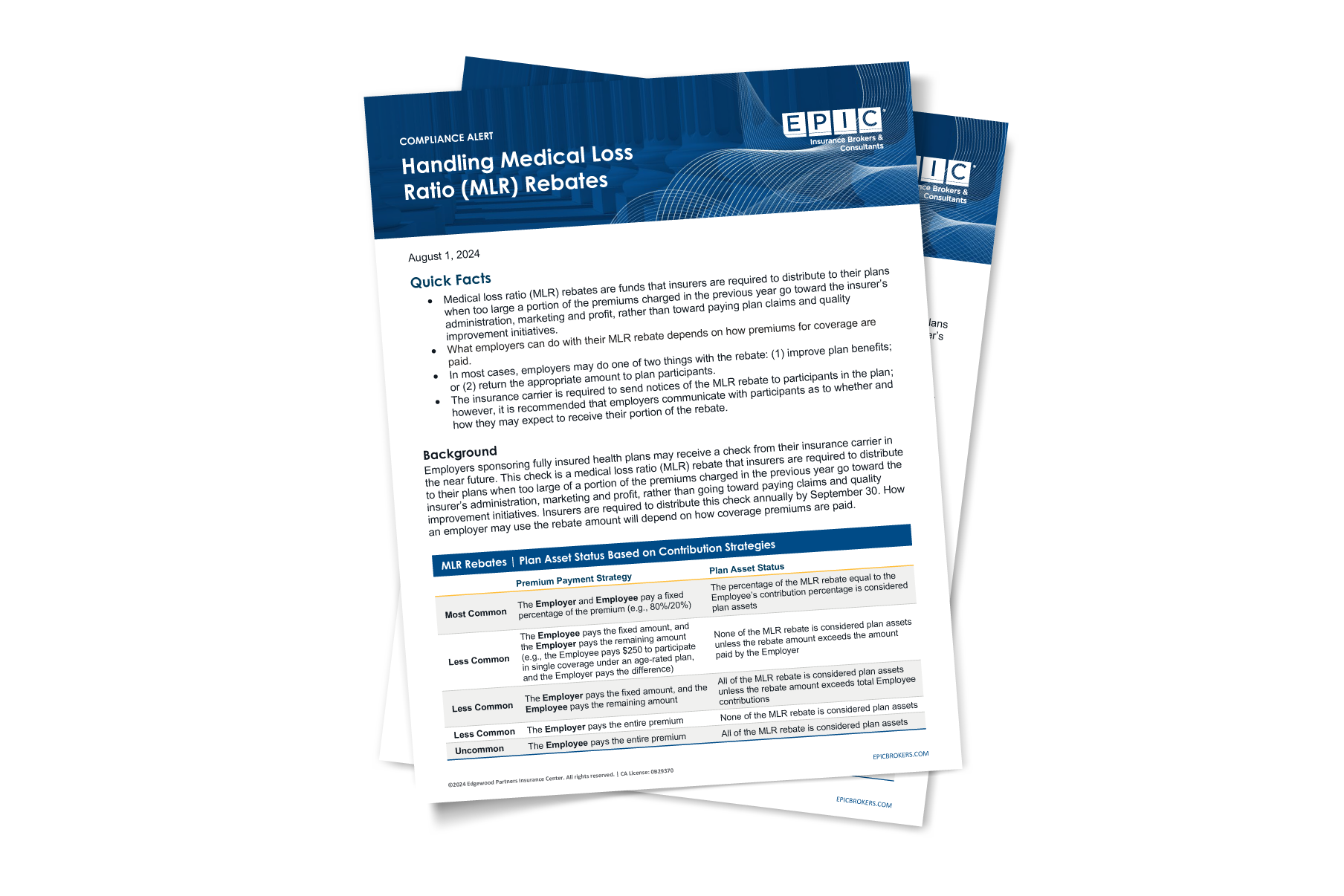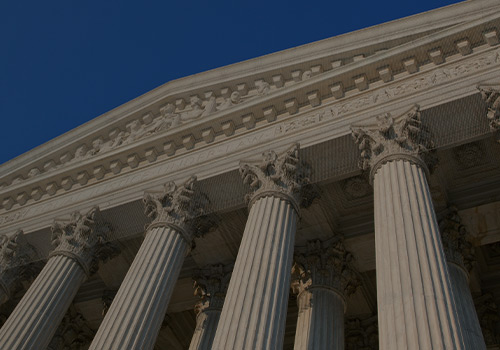Let our team help you navigate the ever-changing benefits compliance landscape each month. Check out this month’s latest alerts, additional updates, and resources hot off the press:
Employee Benefits Compliance Alerts
This month’s Compliance Matters newsletter provides a comprehensive review of the following topics. To obtain your copy, please use the form below to download.

- Gag Clause Prohibition Attestation: Review & Updates for 2024
- Change Healthcare Cyber Attack: Additional Updates & Next Steps
- Handling Medical Loss Ratio (MLR) Rebates
- State Attorneys General Petition SCOTUS to Review Tenth Circuit PBM Decision
- IRS Issues FAQs on Educational Assistance Programs
- 2024 State Regulation Series: New York Health Care Reform Act
Download this month’s alerts
Additional Updates & Resources
Supreme Court Decision May Impact Interpretation of Employee Benefits Regulations
A Supreme Court decision in the case Loper Bright Enterprises v. Raimondo, released in late June, overturned a 40-year precedent known as the Chevron Doctrine. Under the Chevron Doctrine, when a federal statute was silent or ambiguous, courts were expected to defer to federal agency interpretations. These interpretations are common for health and welfare benefits regulations and guidance generally issued by the Department of Labor (DOL), Internal Revenue Service (IRS) and the Department of Health and Human Service (HHS). Going forward, courts have the power to interpret federal statutes that are silent and ambiguous and are not required to defer to federal agency interpretations. While the court case at issue in the Loper Bright case, was not benefits-related and does not have any immediate impact on any benefits-related regulations or guidance issued by federal agencies, such interpretations are perhaps more likely to be successfully challenged in the courts over upcoming months and years, potentially creating some confusion and instability for employers who currently rely heavily on federal agency interpretations of various requirements under the Employee Retirement Income Security Act (ERISA).
The ruling does not invalidate agency regulations or directly impact employee benefits rules; however, it may mean that more challenges to federal agency rules will be made. Unless directed otherwise by Congress or the courts, employers should continue to follow the current interpretations of agencies such as the DOL, IRS and HHS. In July, following the Loper decision, three federal courts challenged the new Final Rules for Affordable Care Act (ACA) Section 1557. We encourage employers to continue to follow agency interpretations, and to monitor any changes. EPIC is monitoring developments and will provide any updates they develop.
Federal Agencies Halt Parts of Section 1557 Final Rules
A federal court in the Southern District of Mississippi recently issued a nationwide injunction on parts of Affordable Care Act (ACA) Section 1557, that were set to go into effect on July 5, 2024. The court invoked a new law set by the Supreme Court of the United States (SCOTUS) in the recent decision in Loper Bright Enterprises v. Raimondo. In the case Tennessee v. Becerra, the court held that there was a substantial likelihood that the Department of Health and Human Services (HHS) exceeded its statutory authority when it interpreted the definition of sex to include gender identity. The court stayed the effective date of the provisions of the regulations that extend “discrimination on the basis of sex” to include gender identity.
This is not the first time the definition of sex under the Section 1557 Final Rules has been disputed. In 2016, a similar injunction was placed on the same definition and provisions. We have likely not seen the end of the debate on these provisions and expect HHS to appeal the injunction.
Fifth Circuit Rules in Preventive Services Case
The Fifth Circuit recently affirmed in the case of Braidwood Mgmt. Inc. v. Becerra which held that appointees to the United States Preventive Services Task Force (USPSTF) are not valid because they violate the Appointments Clause of the United States Constitution. See our previous Alerts and Additional Resources on this case from May 2023 and June 2023.
Section 2713 of the Affordable Care Act (ACA) requires non-grandfathered group health plans to provide certain preventive services at no cost-sharing, including recommended preventive services, and certain evidence-based items and services recommended by the USPSTF. In September 2022, a Texas court held that the members of USPSTF were unconstitutionally appointed and thus lacked the authority to determine the preventive services that must be covered under the ACA. The court later vacated all agency actions taken on or after March 23, 2010, to implement or enforce the USPSTF-recommended preventive care coverage requirements, and the agencies were blocked from implementing or enforcing coverage requirements in response to such USPSTF ratings. In response to the court rulings, the Departments issued a set of frequently asked questions in April 2023 to clarify what the court decision meant for required preventive services. In May 2023, the Fifth Circuit issued a stay on the court’s ruling during the appeal.
In the recently released decision, the Fifth Circuit explained that under the Constitution, the USPSTF members must be appointed by the President and confirmed by the Senate. This process is necessary because of the power exercised by the USPSTF in making recommendations on preventive services required to be covered under the ACA.
The Braidwood decision was limited to the plaintiff who brought the case; therefore, the injunction only applies to the plaintiff’s healthcare plans. This means that other health plans must continue to provide preventive services to plan participants at no cost-sharing.
OCR Provides Resources for New HIPAA Reproductive Healthcare Rules
The Department of Health and Human Services (HHS), which oversees the Office of Civil Rights (OCR), recently updated its webpage with resources for covered entities and business associates that must comply with the Health Insurance Portability and Accountability Act (HIPAA). HIPAA provides national standards for protecting the privacy of individual health information, called protected health information (PHI), for reproductive healthcare, which is broadly defined to include all healthcare related to the functions or processes of the reproductive system. In April 2024, OCR released final rules to support the privacy of reproductive healthcare as part of an initiative by President Biden following the 2022 Supreme Court decision in Dobbs v. Jackson Women’s Health, which overturned Roe v. Wade. The final rules prohibit the disclosure of PHI in relation to healthcare administered in accordance with state and federal law, require an attestation when receiving requests for PHI connected to reproductive health care, require updates to business associate agreements and HIPAA policies and procedures, and require updates to covered entities’ notices of privacy practices. The new rules are already in effect, but the compliance deadline for most of the requirements is December 23, 2024, with the exception of the updates for the notice of privacy practices which is February 2026. Resources from OCR include:
- Video training with examples.
- Toolkit of talking points and key messaging.
- Presentation slides with a summary of the changes and key dates.
- Model Attestation for covered entities and business associates and instructions.
- Summary of the guidance.
For more information on the Final Rules view our June 2024 alert.

More Compliance Resources
- Sign up for our in-depth 2024 Compliance Webinars
- Learn about our Compliance Consulting Services

WANT TO GET COMPLIANCE MATTERS IN YOUR INBOX?
Sign up for the monthly newsletter.
